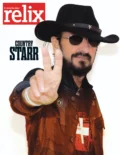
An image from Bonnaroo 2006 by kevin Yatarola
TH: Now I’d like to take a moment for what I’d like to call Dr. John’s Dictionary. I was hoping you would define some of the terms that show up in your work.
MR: No problem.
TH:Gris-gris:
It’s an African term, it might be what you would call voodoo, but it really represents that there is no black or white in anything that everything is shades of grey, and that’s kind of a way to work. It comes from Africa, but it’s a French word.
TH: Sippiana:
MR: It’s the coast right between Mississippi and Louisiana where the Hurricane hit. My father and a lot of the old-timers used to call that Sippiana and we used to fish a lot, on the boat we’d go from Louisiana, and be in Mississippi and some other areas still fishing from one to the other, and all along that Sippiana Coast was good fishing without going into the Gulf of Mexico or anything else. You could stay in the brackish waters inland which are disappearing, which is another thing that’s affecting the good food down here because of all this stupidity.
TH: Mama Roux:
MR: This was a story that I wrote about a gris-gris queen down there. I didn’t know that one of the women was also one of the queens of the Indians, the little red-white-and-blues. When I was a kid there was one of the famous Indian Tribes, the Mardi Gras Indians, and she was double well-known.
TH: Mos’ Scoscious:
MR: Scoscious is kind of like a combination of scrumptious and delicious. Typical Ninth Ward word.
TH:Jockamo feeno ah nah nay, jockamo feena nay:
MR: Well, you’ll have to ask one of the Mardi Gras Indians. There might be one or two at the gig. Just ask them.
TH: Back to matters of a bit more gravity, Katrina devastated New Orleans in a way I can’t really put into words. How has it affected you? How has it affected your shows?
MR: We made a record called Sippiana Hericane right after that. I say something about it at my shows, and it’s not nothing nice I’m saying about a lot of people. I’m a coonass from Louisiana, and we some grudge-holding suckas and we are not people to mince our words about nothing.
To make a long story short: we are aggravated and disgusted that they want to put a third-world country levee back up that was never sufficient to maintain a problem that’s been going on for fifty years. They want to rebuild the levee, and it might help if they guaranteed it would hold up, and on and on, but there’s people scattered and splattered all over the United States, and there’s people scared to go home that could possibly go home cause it’s so shaky what they did, et cetera, et cetera, et cetera. I’m not too thrilled with none of it.
I just go out and tell the truth the best I know it, and I get a lot of flak from a lot of people. I hear about stuff from the e-mails and all that, but I’ve got the attitude that that’s just how it is.
TH:I think that I’m going to remember forever the look on your face when you closed Shelter from the Storm and sang “Walking to New Orleans.” I think the horror there said more about the devastation than anything and I think it got the point across to everyone who watched the benefit.
MR: That’s Bobby Charles’ song that he wrote for Fats Domino. The whole town where he was in South Louisiana is gone, in what they used to call the Cajun Riviera. It ain’t no more.
We were driving back from a gig in Galveston, and when we drove and crossed the Texas border highways was fine in Texas. Soon as we hit Louisiana, it was a disaster area. It looked like a volcano had just wiped out Houma, Lake Charles, and all that area just flattened. As you went further east towards New Orleans, it looks like they dropped atom and hydrogen bombs all over St. Bernard. As you’re proceeding east, it just looks like different kinds of the highways are so bad, everything you’re dealing with is so bad. It’s very, very hard for people to understand the depth of the destruction.


No Comments comments associated with this post